The Thinkers Guide to
The Art of
Asking Essential Questions
By
Dr. Linda Elder
and
Dr. Richard Paul
Based on
Critical Thinking Concepts and Socratic Principles
Foundation for Critical Thinking Press

Copyright Foundation for Critical Thinking 2010
Foundation for Critical Thinking Press
707-878-9100
www.criticalthinking.org
cct@criticalthinking.org
All rights reserved. No part of this guide may be reproduced, in any form or by any means, without permission in writing from the Foundation for Critical Thinking, except for the quotation of brief passages in criticism.
Printed in the United States of America.
ISBN 978-0-944583-16-6
Dear Reader:
This miniature guide introduces the art of asking essential questions. It is best used in conjunction with The Miniature Guide to Critical Thinking and The Miniature Guide to How to Study and Learn
The quality of our lives is determined by the quality of our thinking. The quality of our thinking, in turn, is determined by the quality of our questions, for questions are the engine, the driving force behind thinking. Without questions, we have nothing to think about. Without essential questions, we often fail to focus our thinking on the significant and substantive.
When we ask essential questions, we deal with what is necessary, relevant, and indispensable to a matter at hand. We recognize what is at the heart of the matter. Our thinking is grounded and disciplined. We are ready to learn. We are intellectually able to find our way about.
To be successful in life, one needs to ask essential questions: essential questions when reading, writing, and speaking; when shopping, working, and parenting; when forming friendships, choosing life-partners, and interacting with the mass media and the Internet.
Yet few people are masters of the art of asking essential questions. Most have never thought about why some questions are crucial and others peripheral. Essential questions are rarely studied in school. They are rarely modeled at home. Most people question according to their psychological associations. Their questions are haphazard and scattered.
Essential questions fall into a range of categories. Some essential questions are principally analytic, some principally evaluative. Some apply predominantly to academic subjects, others to our innermost thoughts, feelings, and desires.
As you might expect, the categories and lists of essential questions in this mini-guide are illustrative, not exhaustive. Furthermore, the ideas we provide are useful only to the extent that they are employed daily to ask essential questions. Practice in asking essential questions eventually leads to the habit of asking essential questions. But we can never practice asking essential questions if we have no conception of them. This mini-guide is a starting place for understanding concepts that, when applied, lead to essential questions.
Sincerely,

Richard Paul
Center for Critical Thinking | 
Linda Elder
Foundation for Critical Thinking |
Contents
Introduction:
The Power of Essential Questions
It is not possible to be a good thinker and a poor questioner.
Questions define tasks, express problems, and delineate issues. They drive thinking forward. Answers, on the other hand, often signal a full stop in thought. Only when an answer generates further questions does thought continue as inquiry. A mind with no questions is a mind that is not intellectually alive. No questions (asked) equals no understanding (achieved). Superficial questions equal superficial understanding, unclear questions equal unclear understanding. If your mind is not actively generating questions, you are not engaged in substantive learning.
Thinking within disciplines is driven, not by answers, but by essential questions. Had no basic questions been asked by those who laid the foundation for a field for example, physics or biology the field would not have been developed in the first place. Every intellectual field is born out of a cluster of essential questions that drive the mind to pursue particular facts and understandings. Biology was born when some humans pursued answers to the questions: What are the characteristics of living systems? What structures exist in them? What functions do these structures serve? Biochemistry was born when biologists began to ask questions such as: What chemical processes underlie living things? How and why do chemical processes within living things interact and change?
Every field stays alive only to the extent that fresh questions are generated and taken seriously as the driving force in thinking. When a field of study is no longer pursuing significant answers to essential questions, it dies as a field. To think through or rethink anything, one must ask the questions necessary to thinking through the logic of that thing, clearly and precisely.
In this miniature guide, we introduce essential questions as indispensable intellectual tools. We focus on principles essential to formulating, analyzing, assessing, and settling primary questions. You will notice that our categories of question types are not exclusive. There is a great deal of overlap between them. Deciding what category of question to ask at any point in thinking is a matter of judgment. Having a range of powerful questions to choose from is a matter of knowledge.
Because we cannot be skilled at thinking unless we are skilled at questioning, we strive for a state of mind in which essential questions become second nature. They are the keys to productive thinking, deep learning, and effective living.
Part One: Analytic Questions
Asking essential analytic questions is vital to excellence in thought. When we analyze, we break a whole into parts. We do this because problems in a whole are often a function of problems in one or more of its parts. Success in thinking depends, first of all, on our ability to identify the components of thinking by asking essential questions focused on those components.
Questioning the Structure of Thinking
One powerful way to discipline your questions is to focus on the components of reasoning, or parts of thinking. They are as follows:
As you formulate questions, consider the following guidelines and sample questions:
1. Questioning Goals and Purposes . All thought reflects an agenda or purpose. Assume that you do not fully understand someones thought (including your own) until you understand the agenda behind it. Questions that focus on purpose in thinking include:

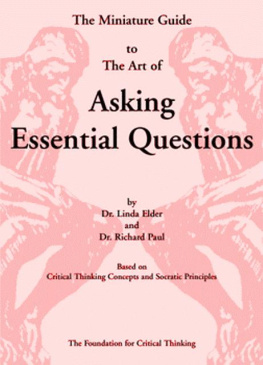
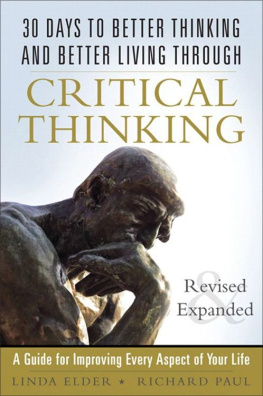
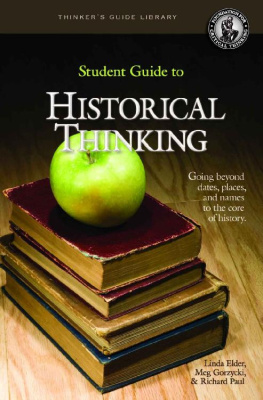
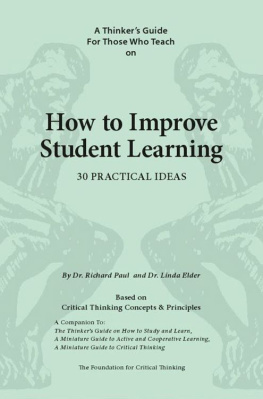

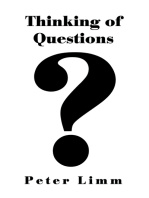

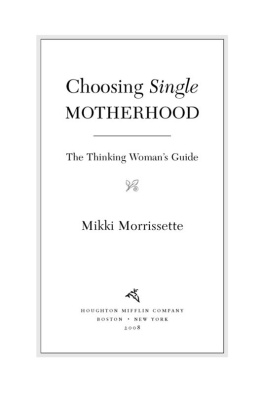
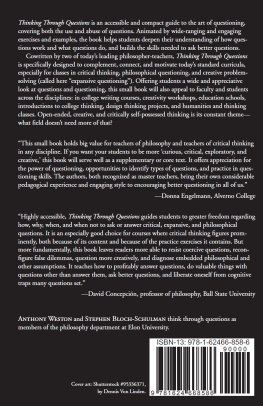
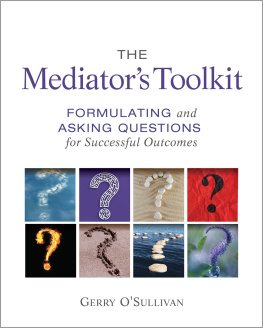
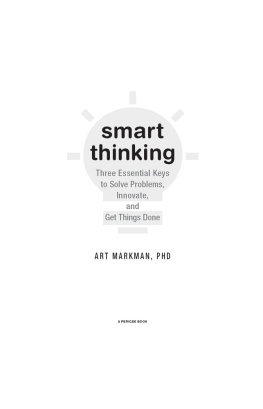
 Copyright Foundation for Critical Thinking 2010
Copyright Foundation for Critical Thinking 2010



